Eating a Lot of Feta Cheese What Can Cause
Serious Signs You're Eating Too Much Cheese
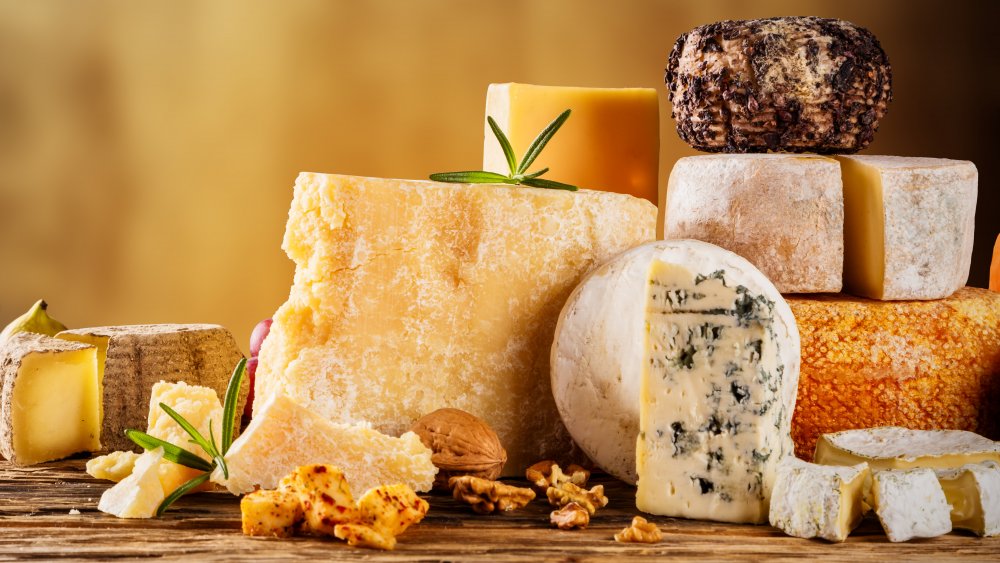
Shutterstock
Whether you love eating cheese melted atop a pizza, mixed in your morning breakfast burrito, or served up with crackers on a fancy nosh plate, there are thousands of ways to enjoy cheese and thousands of cheeses to enjoy. Some cheeses, like ricotta, are fresh while others, such as cheddar and Parmesan, are aged. And then there's processed cheeses like American cheese that aren't actually cheese but are still a guilty pleasure for many.
People in the United States eat a lot of cheese. According to research conducted by Rabobank and the U.S. Department of Agriculture (USDA), the average American eats nearly 37 pounds of cheese every year. But how much should we be eating? The USDA recommends that everyone age nine and older consume three servings of dairy per day. In cheese math, one serving of dairy means 1.5 ounces of hard cheese, one-third of a cup of shredded cheese, half a cup of ricotta, or 2 ounces of processed cheese.
Given the deliciousness and versatility of cheese, however, it's easy to eat more than the recommended three servings a day. So how can you tell if you've been hitting the cheddar a little too hard? Here's a look at some serious signs.
Overindulging in cheese could cause high blood pressure
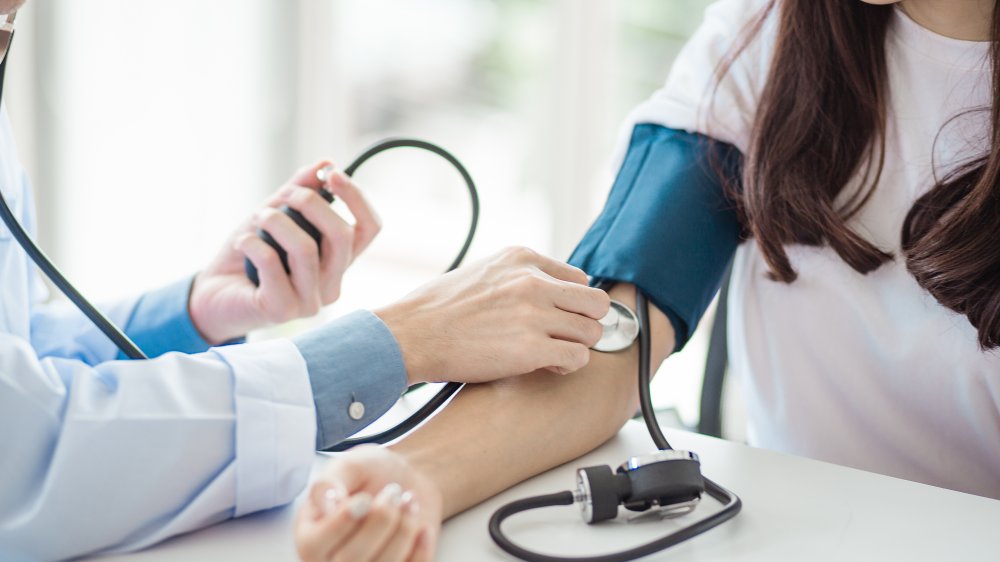
Shutterstock
The 2015–2020 Dietary Guidelines for Americans recommends that Americans limit their sodium intake to no more than 2,300 mg a day. The report also noted, however, that the average American consumes about 3,400 mg daily, and high sodium consumption is considered a risk factor for high blood pressure.
The bad news is that many cheeses are high in sodium. An ounce of feta, for example, has a staggering 360 mg — about 15 percent of your daily limit. But not all cheeses are created equal when it comes to their effect on blood pressure. Research published in the European Review of Medical and Pharmacological Sciences in 2018 studied the effects of Grana Padano, an Italian semi-fat cheese, and found that participants who ate 30 grams daily actually lowered their blood pressure.
Citing the study's author Giuseppe Crippa, director of the hypertension unit at the Guglielmo Saliceto Hospital in Italy,Men's Healthrevealed that this particular cheese contains two compounds — isoleucine-proline-proline (IPP) and valine-proline-proline (VPP) — that relax blood vessels and lower blood pressure. But for everyone not eating this kind of cheese, it's a good idea to watch the sodium in the cheeses you do eat, particularly if you already have high blood pressure.
Is cheese to blame for your weight gain?
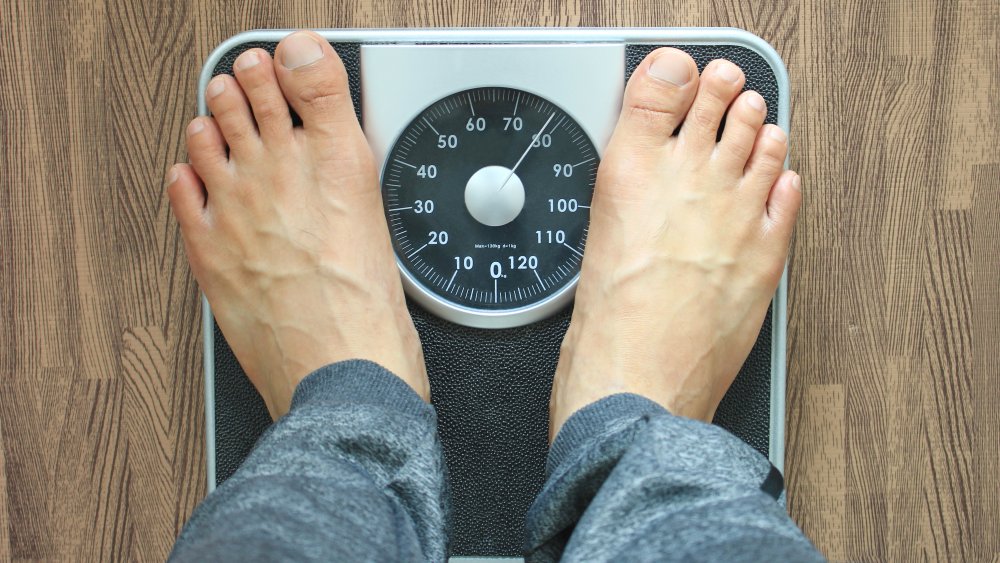
Shutterstock
According to the energy balance model of weight control, if you eat more calories than you burn, you'll gain weight, and if you expend more than you consume, you'll lose weight. Unfortunately for cheese lovers, many cheeses tend to be very calorie dense because of their high fat content. While 1 gram of carbohydrate or protein contains only 4 calories, a gram of fat contains 9 calories.
According to Healthline, an ounce of Swiss or brie contains 100 calories and 9 grams of fat. An ounce of Gouda ranks similarly, with 110 calories and 9 grams of fat while the same amount of cheddar packs 120 calories and 10 grams of fat. For a lighter alternative, you can choose more moisture-rich cheeses like feta (a cup has 60 calories and 4 grams of fat) or mozzarella (an ounce has 85 calories and 6 grams of fat).
While the calories and fat from cheese can quickly add up, WebMD pointed out that eating low-fat cheese in moderation may actually help with weight loss. The theory behind this seeming contradiction is that when our bodies get enough calcium — which is plentiful in cheese — it encourages fat burning.
Your high cholesterol may or may not be the result of your love affair with cheese

Shutterstock
According to the Centers for Disease Control and Prevention (CDC), 29 million Americans (more than 12 percent of adults aged 20 and up) have total cholesterol levels higher than 240 mg/dL. The CDC noted that high cholesterol is a risk factor for heart disease, the leading cause of death in the United States.
The American Heart Association (AHA) has linked the saturated fat in cheese and other dairy products to increased low-density lipoprotein (LDL), or "bad" cholesterol, and thus, heart disease. The AHA recommends that saturated fat should make up no more than 5 or 6 percent of your daily calories.
However, not all experts agree. One 2015 study published in Food and Nutrition Researchfound that "cholesterol levels did not increase after high intake of 27% fat Gouda-type cheese over 8 weeks' intervention." A meta-analysis published in The American Journal of Clinical Nutrition in 2016 concluded that "dairy fat intake was not significantly related to risk of total CVD [cardiovascular disease]," although they did note that replacing the fat in dairy products with polyunsaturated fats from vegetable oils decreased cholesterol levels.
Is too much cheese the reason for your sinus congestion?

Shutterstock
Contrary to what we were told growing up, milk and dairy products like cheese don't actually increase mucus production when you have a cold. But there's another reason that some people feel stuffy after they eat cheese.
According to Healthline, histamine is a chemical produced by the body and found in some foods that triggers the release of stomach acid to aid digestion. It's also part of the body's immune response that occurs after an injury or allergic reaction. The enzyme diamine oxidase (DAO) breaks down histamine, but some people either have a DAO deficiency or an imbalance in their gut bacteria that leads to a buildup of more histamine than their DAO levels can handle. These people have what's known as histamine intolerance and, when histamine levels get too high, it can cause a number of unpleasant symptoms, including nasal congestion and sinus problems.
According to a 2007 study published in The American Journal of Clinical Nutrition, one percent of the population is histamine intolerant. Unfortunately for cheese fanatics, aged cheeses are particularly high in histamine, and overindulging could lead to uncomfortable stuffiness.
If you get frequent migraines, you may need to cut back on cheese

Shutterstock
If you have a histamine intolerance, exposure to too much histamine — like what's found in aged cheese — can cause headaches and migraines, according to Healthline.Aged cheeses can also present another problem for migraines sufferers because of their high tyramine content. According to WebMD, tyramine is a substance known as a monoamine and is found in aged and fermented foods.
Our bodies produce the enzyme monoamine oxidase (MAO) to help break down tyramine. However, for those who don't produce enough MAO or are on a type of antidepressant known as a monoamine oxidase inhibitor (MAOI), tyramine can build up in the system. How exactly it causes migraines is unknown, but tyramine may trigger production of too much norepinephrine, which, in turn, can cause changes in the brain that lead to migraines. If you are of the 12 percent of Americans who suffer from migraines, you may need to stick to cheeses that haven't been aged, like mozzarella.
Overeating cheese can lead to heartburn

Shutterstock
According to the American College of Gastroenterology, more than 60 million Americans get heartburn at least once per month. Frequent heartburn may be a sign of gastroesophageal reflux disease (GERD), which can have serious consequences — like esophageal cancer — if left untreated.
Johns Hopkins Medicine noted that cheese is a food that can often cause heartburn. This may be because eating cheese triggers the release of a hormone called cholecystokinin. When we eat foods containing fat and protein (both of which are found in cheese), cells in the small intestine secrete cholecystokinin. This messenger signals the pancreas to release digestive enzymes and the liver to release bile, both of which help break down the fat and protein.
Research published in the journalGut found that high levels of cholecystokinin caused the lower esophageal sphincter (LOS) to relax, making it easier for stomach acid to flow back up into the esophagus, causing heartburn.
Eating too much cheese can cause bloating
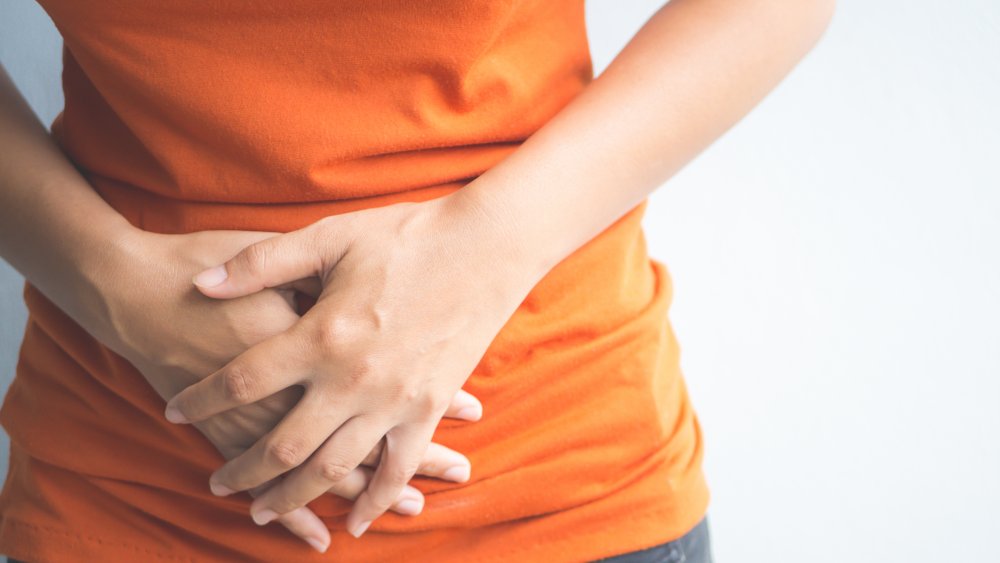
Shutterstock
Just because we love the taste of cheese doesn't mean our bodies love digesting it. In fact, a 2013 paper published in the European Review of Medical and Pharmacological Sciences noted that approximately 75 percent of the global population loses the ability to digest lactose — which is found in cheese and other dairy products — at some point in their lives.
According to the Mayo Clinic, lactose intolerance occurs when the small intestine can no longer produce enough of the enzyme lactase to break down the lactose in the dairy products we eat or drink. This can cause a variety of unpleasant gastrointestinal symptoms, including bloating. How much lactase a person can produce will dictate just how lactose intolerant they are.
If you're lactose intolerant and want to avoid the bloating cheese can cause, one option is to take medication that contains the lactase enzyme. When speaking with Self magazine, registered dietitian Alissa Rumsey offered another option: Experiment with your diet to see exactly how much lactose you can consume before it adversely affects you. You may find "hard cheeses, like Parmesan and Swiss" easier to tolerate than other cheeses due to their "lower lactose content," according to Rumsey.
If you're always gassy, cheese may be the culprit
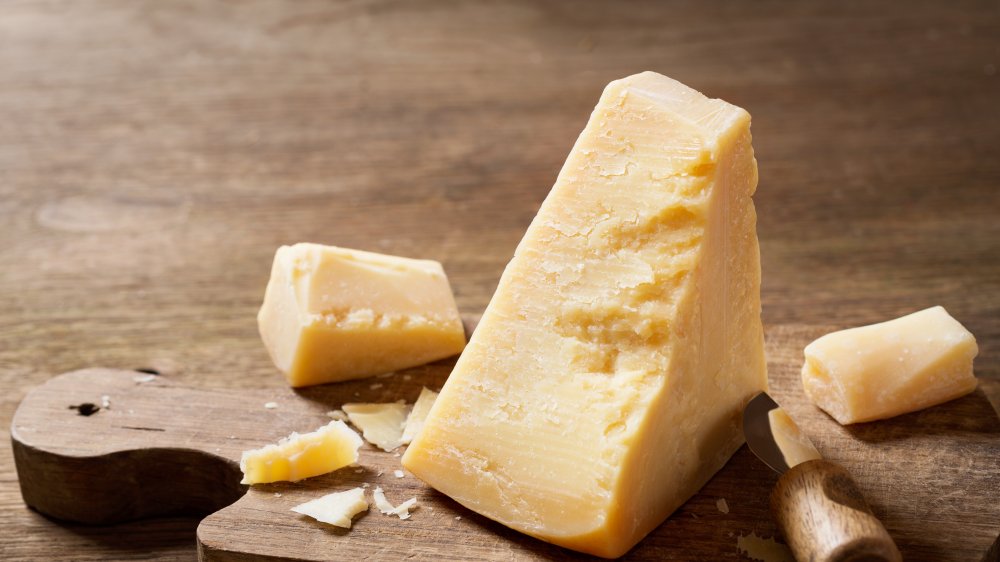
Shutterstock
A particularly uncomfortable symptom of lactose intolerance is gas. Registered dietitian Trista Best explained to Health Digest that excessive gas is not a normal part of the digestion process and is instead a signal that things aren't being broken down properly. Even if you don't normally have a problem with cheese, Best revealed that eating too much at one time can cause issues. In speaking withHealth Digest, she revealed, "Even those without a lactose intolerance diagnosis can have temporary lactose intolerance side effects when they eat too much cheese. If too much is eaten at one time, the body may not be able to produce lactase fast enough to keep up, which leads to gas and other gastrointestinal discomfort."
But how exactly does the lactose in cheese cause gas? According to a 2002 paper published in the American Family Physician, when someone who's lactose intolerant consumes lactose, their bodies are unable to digest it. As such, bacteria in the large intestine then ferments the lactose. This fermentation process produces gas.
Healthline noted that lactose belongs to a group of sugars known as FODMAPs (fermentable oligo-, di-, mono-saccharides and polyols). Some people are sensitive to FODMAPs and must avoid or restrict particular sugars to avoid GI upset.
This may be a sign that you need to eat less cheese

Shutterstock
For those who are lactose intolerant, eating cheese can really wreak havoc in the body. WebMD noted that diarrhea is one of the many gastrointestinal symptoms associated with lactose intolerance. The good news is that some cheeses are quite low in lactose and should be safe to eat for most lactose intolerant people. An article published in the magazine Real Simple highlighted nine of the lowest-lactose cheeses: muenster, Camembert, brie, cheddar, provolone, Gouda, blue, Parmesan, and Swiss.
But, ironically, eating too much cheese can also lead to constipation. If your diet contains so much cheese that it leaves you too full to consume other, more colon-friendly foods, constipation may result, SFGateexplained.
The article noted, "If your diet was high in cheese but low in high-fiber plant foods, you might want to blame your constipation on the cheese, but in fact the culprit would be the absence of fiber." So if you're going to go crazy on the cheese, make sure you balance out your diet with fiber-rich vegetables and whole grains.
Are you having an allergic reaction to the cheese you eat?
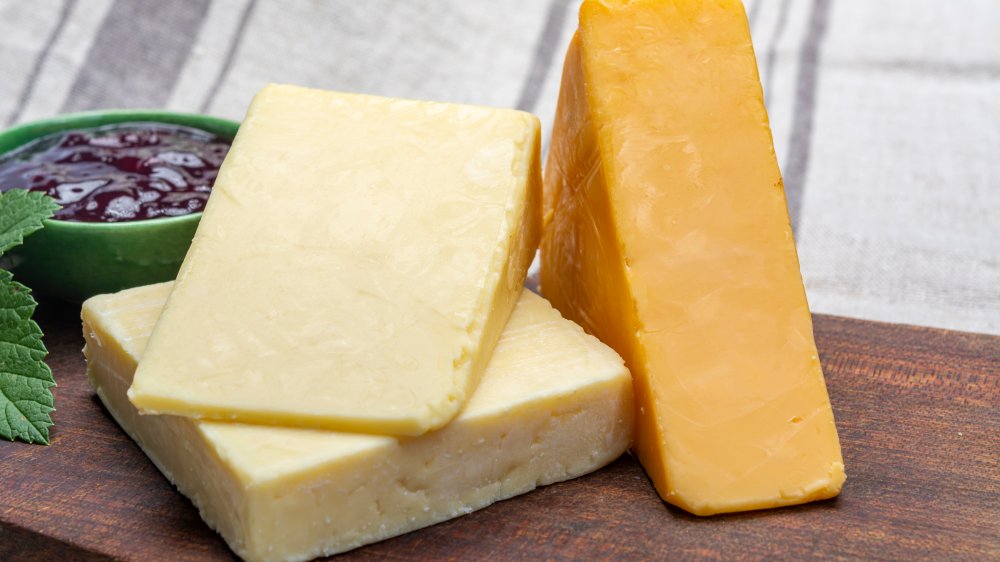
Shutterstock
Although many people mislabel their lactose intolerance a milk allergy, the two conditions are actually very different. According to the Mayo Clinic, people with a milk allergy have an abnormal reaction to one or both of the proteins in dairy products, casein and whey. Eating dairy triggers an immune response that can cause hives, swelling in and around the mouth, shortness of breath, GI upset, and, in severe cases, anaphylaxis and even death. Lactose intolerance, on the other hand, is caused by the body's inability to digest the sugar (lactose) in milk and doesn't affect the immune system.
The American College of Asthma, Allergy & Immunology reported that two to three percent of children under the age of three are allergic to milk, and about 20 percent will not outgrow the allergy by the time they turn 16.
While people with a milk allergy must avoid all dairy products, cheese is particularly dangerous for those allergic to the casein in dairy. As Forbes explained, "A cup of milk contains 7.7 grams of protein, 80% of which is casein. When converted to cheddar, for example, the protein content multiplies 7-fold, to 56 grams."
Eating too much cheese could be causing your breakouts

Shutterstock
If you're dealing with adult acne, you should know that the cheese you're eating may not be doing your skin any favors. The Mayo Clinic called out four underlying causes of acne: excess oil production, clogged hair follicles, bacteria, and overactivity of androgens. The clinic noted that diet, particularly some dairy products and carb-rich foods, may worsen acne.
It isn't clear exactly how dairy products affect acne. Healthline highlighted several theories, including a possible connection between the hormones given to dairy cows and our own delicate hormonal balance. The growth hormones naturally present in milk might also be to blame. A third possibility is that dairy, combined with refined carbohydrates, may increase insulin levels and make skin more prone to acne.
And even if cheese isn't contributing to your breakouts, it may be causing other skin problems. As registered dietitian Trista Best told Health Digest, "Sensitivities to dairy can also express themselves on the skin through rashes, dry patches, and uneven skin tone."
Overindulging in cheese could worsen your sleep apnea

Shutterstock
Eating a cheese-heavy meal, especially at dinner, may make it more difficult for you to get a good night's sleep. A 2018 study published in the American Journal of Lifestyle Medicine examined how different dietary factors affected the severity of obstructive sleep apnea (OSA) among 104 participants with the condition. The study's authors, led by board-certified internist Caitlin Bove, found that "eating greater than 2 servings of dairy daily was associated with worsening severity of OSA." It's important to note, however, that the researchers did not distinguish between different types of dairy products.
Sleep apnea is a condition in which breathing stops and starts as someone sleeps. OSA is the most common form, and occurs when the throat muscles relax and close off the airway. It's a serious condition that also increases a person's risk for a number of other conditions, including type 2 diabetes, metabolic syndrome, high blood pressure, and heart attack. According to the American Sleep Apnea Association, 22 million Americans have sleep apnea, but 80 percent of moderate and severe cases go undiagnosed.
Should you be worried about breast cancer if you eat a lot of cheese?
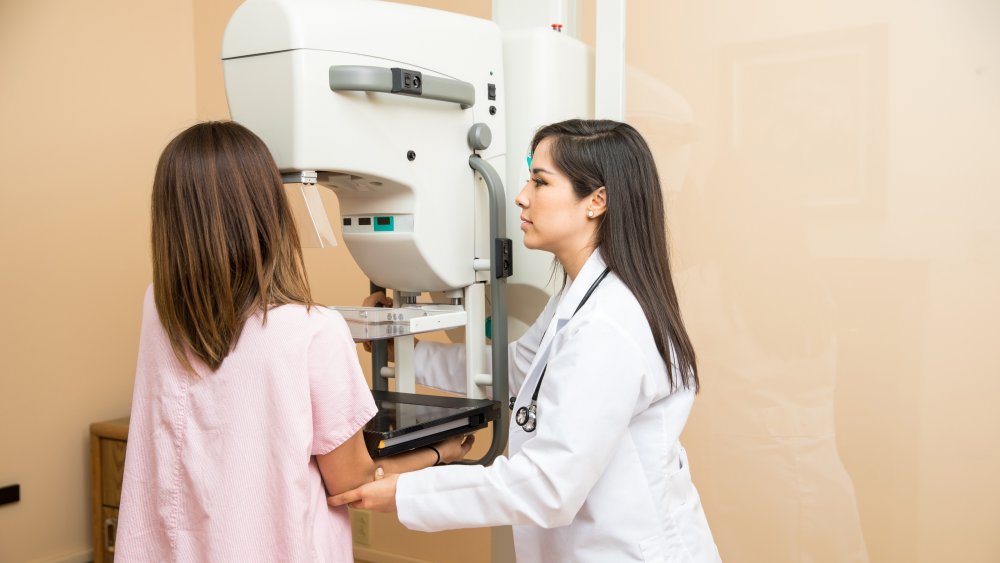
Shutterstock
Roughly one in eight women will be diagnosed with breast cancer at some time in her life. It's the second-most diagnosed cancer (behind skin cancer) and, because it's so common, researchers have worked hard to try to determine which factors may increase or decrease a person's chances of having breast cancer. In the case of cheese and other dairy products, however, the evidence is conflicting.
For example, an older study published in the Journal of the National Cancer Institute analyzed the eating habits of nearly 3,000 French women and concluded that "the risk of breast cancer was found to be positively associated with frequency of cheese consumption and the level of fat in the milk consumed." But another study, published in the journal Cancer Research some three years later, came to a different conclusion. The researchers focused on fermented dairy products such as yogurt, buttermilk, and cheese and found that "a statistically significant decrease in breast cancer risk was also observed for increasing intake of Gouda cheese."
Interestingly, a 2020 study revealed that "higher intake of dairy milk were associated with greater risk of breast cancer" whereas "no important associations were noted with cheese and yogurt."
Cheese may actually be addictive

Shutterstock
If you're suffering some of the negative consequences of eating too much cheese but it feels like you just can't kick the habit, it may be the cheese — not your willpower — that's to blame. Dr. Neal Barnard, a clinical researcher and author of The Cheese Trap, explained thatcheese contains casein fragments known as casomorphins (via Forbes). Casomorphins are a type of natural opiate and function the same way as other opiates do in the body. According to Barnard, "These opiates attach to the same brain receptors that heroin and morphine attach to. They are not strong enough to get you arrested, but they are just strong enough to keep you coming back for more."
The addictive quality of cheese was confirmed in a 2015 study led by Dr. Erica M. Schulte that analyzed the addictiveness of different foods based on participants' rankings and responses on the Yale Food Addiction Scale. Of the foods examined, cheese came in at number 16. Several processed foods containing cheese, however, scored even higher. Cheeseburgers came in at ninth place and pizza was near the top of the list at number four. There's no Cheeseaholics Anonymous yet, but maybe there should be.
Eating a Lot of Feta Cheese What Can Cause
Source: https://www.healthdigest.com/240220/serious-signs-youre-eating-too-much-cheese/